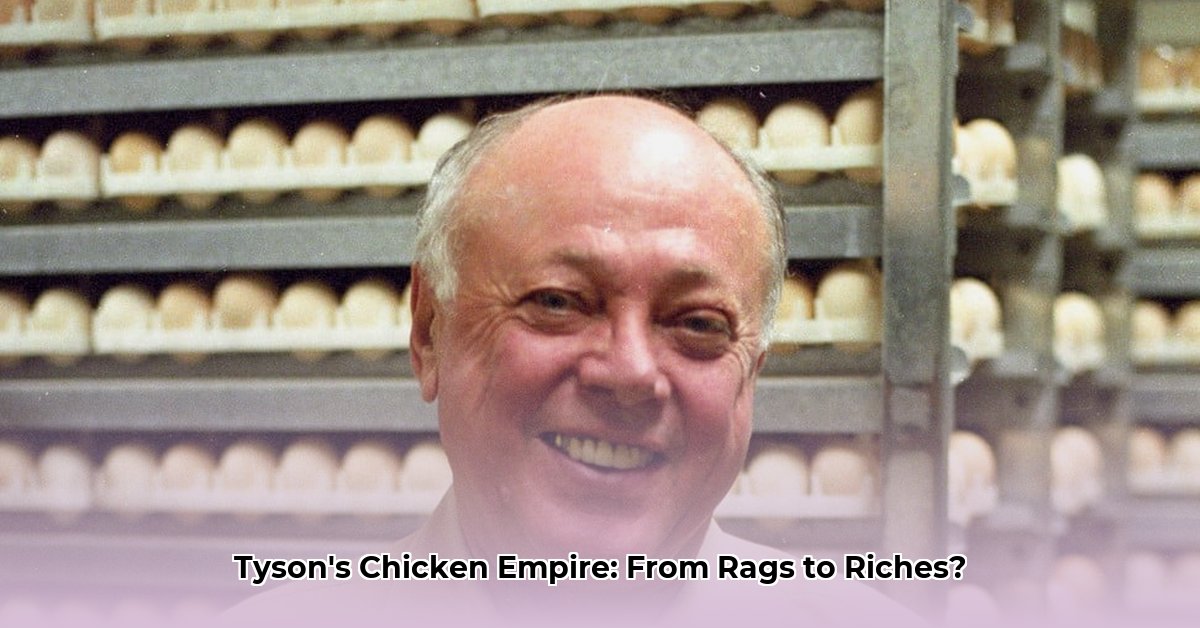
Don Tyson’s story transcends mere wealth; it’s a quintessential American narrative of ambition, innovation, and the complex consequences of success. It begins not in gilded boardrooms, but on a modest Arkansas farm, steeped in the tradition of poultry farming. This humble upbringing, interwoven with the family’s legacy in the industry, formed the bedrock of his future empire. His journey, propelled by a potent blend of vision and relentless hard work, transformed him from a local farmer's son into a titan of the global food industry. But the path to a net worth estimated at $1.2 billion wasn't without its ethical complexities. How did the ethical controversies surrounding his business, Tyson Foods, shape his legacy and ultimate financial success?
From Family Farm to Food Giant: Building the Tyson Empire
Don Tyson didn't merely raise chickens; he revolutionized the industry. He possessed an unparalleled strategic vision, recognizing the potential for unparalleled efficiency and market dominance. His leadership reshaped Tyson Foods from a small, regional operation into a global powerhouse. He masterminded aggressive expansions, strategic acquisitions that broadened their reach, and innovative marketing that cemented his brand in the public consciousness. The Chicken McNugget, for example, became a cultural icon and a massive revenue driver, propelling Tyson Foods to unprecedented heights. This strategic brilliance significantly impacted his net worth, but it also attracted intense scrutiny. Did this aggressive expansion ultimately outweigh the ethical dilemmas it created?
The Chicken McNugget Conundrum: Success and its Shadows
Tyson Foods' meteoric ascent wasn't without its ethical controversies. The company faced considerable criticism regarding its practices, particularly concerning animal welfare. Critics raised serious questions about the treatment of animals within Tyson facilities, arguing that the scale of production compromised ethical standards. Concerns extended beyond animal welfare to encompass labor practices and environmental impact. Mass-scale poultry production, while undeniably efficient, raises profound questions about its long-term sustainability. Some argued that the pursuit of profit overshadowed concerns for animal and worker well-being, creating an ethical dilemma that continues to resonate today. How did the public perception of these ethical concerns affect the long-term value of Tyson Foods?
Navigating Regulatory Waters: The SEC's Scrutiny
The intense scrutiny didn't solely emanate from animal welfare advocates. The Securities and Exchange Commission (SEC) launched an investigation into Tyson Foods, focusing on the delicate interplay between personal assets and corporate funds – a frequent challenge for family-run businesses. Questions arose about the transparency of financial dealings and the potential for conflicts of interest to compromise sound business practices. The SEC's actions highlighted the risks inherent in blurring lines between personal and corporate finances, even for a company as successful as Tyson Foods. While the precise impact on Don Tyson's net worth remains somewhat unclear, this episode introduced significant uncertainty into his financial picture. Was the SEC investigation a pivotal moment in shaping Tyson’s business strategies?
Don Tyson's Net Worth: A Legacy of Complexity
At the apex of his success, Don Tyson's net worth reached an estimated $1.2 billion. This staggering figure attests to his exceptional business acumen and Tyson Foods' remarkable growth. However, understanding his legacy requires acknowledging the ethical complexities that accompanied this success. His story isn't a simple equation of profits and losses; it's a nuanced exploration of ambition, innovation, and the ethical dilemmas inherent in constructing a massive food empire. What can we learn from the complexities of his story?
A Multifaceted Legacy: The Enduring Questions
Don Tyson's life and career leave behind a complex and enduring legacy. Undeniably, he built an economic empire, providing employment for countless individuals and feeding millions worldwide. Yet, his methods, and those of the industry as a whole, remain subjects of ongoing debate. His story prompts critical reflection on the ethical responsibilities inherent in large-scale business success. The ongoing discussion surrounding animal welfare, labor practices, and environmental impact in the food industry owes a significant debt to the legacy of Tyson Foods. His narrative serves as a crucial case study for aspiring entrepreneurs, a reminder that substantial success often entails significant ethical responsibilities. Therefore, fully grasping Don Tyson's net worth requires a comprehensive understanding of his multifaceted impact.
Future Research and Unanswered Questions
While we have a substantial understanding of Don Tyson's life and Tyson Foods' trajectory, certain areas call for further investigation. The long-term environmental effects of large-scale poultry production, particularly concerning water usage and greenhouse gas emissions, remain a crucial area of ongoing research. Similarly, a more in-depth analysis of Tyson Foods' economic impact on its employees and surrounding communities is warranted. Future research could clarify the ways in which regulatory pressure influenced the company's practices, shedding light on the long-term impact of the SEC investigation on both Tyson Foods and Don Tyson himself. The story of Don Tyson remains an evolving narrative—a continuing dialogue about the complex interplay of ambition, ethics, and economic power in the modern world. What other crucial aspects of his life and business deserve further scrutiny?